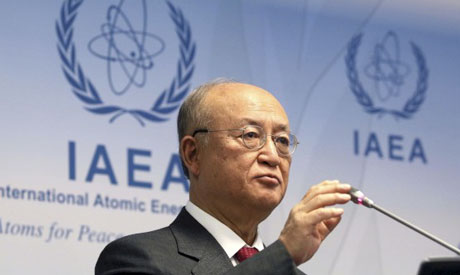
Director General of the International Atomic Energy Agency, IAEA, Yukiya Amano of Japan, addresses the media during a news conference after a meeting of the IAEA board of governors at the International Center in Vienna, Austria, Monday, March 5, 2018. (AP)
A collapse of the Iran nuclear deal would be a "great loss", the U.N. atomic watchdog's chief warned U.S. President Donald Trump on Monday, giving a wide-ranging defence of the accord and his agency's work under it.
Trump has threatened to withdraw the United States from the accord between Tehran and six world powers, signed in 2015 before he took office, unless Congress and European allies help "fix" it with a follow-up pact. Trump does not like the deal's limited duration, among other things.
Iran has stayed within the deal's restrictions since Trump took office but has fired diplomatic warning shots at Washington in recent weeks. It said on Monday that it could rapidly enrich uranium to a higher degree of purity if the deal collapsed.
"If the JCPOA were to fail, it would be a great loss for nuclear verification and for multilateralism," International Atomic Energy Agency (IAEA) chief Yukiya Amano said in a speech to his agency's 35-nation Board of Governors, using the deal's official name, the Joint Comprehensive Plan of Action.
Amano, whose agency polices the deal's nuclear restrictions, later gave his most wide-ranging defence of the accord to date, listing numbers of buildings inspected, images captured and even seals placed on equipment since the accord was put into effect.
"The IAEA now has the world's most robust verification regime in place in Iran. We have had access to all locations that we needed to visit," the veteran Japanese diplomat told a news conference after his speech.
Amano declined to comment on the position of the United States or any other country, but his remarks were clearly a response to Trump's threat to scupper the accord, which also lifted painful economic sanctions against Iran.
"We have carried out more than 60 complementary accesses and visited more than 190 buildings since JCPOA Implementation Day," he said, referring to a specific type of inspection under the IAEA's Additional Protocol, which Iran is implementing under the deal.
Washington is telling European allies it wants a follow-on agreement that "ensures strong IAEA inspections", according to a State Department cable obtained by Reuters last month.
That suggests that, from Washington's standpoint, there is something deficient about the current inspection system.
Trump and his ambassador to the United Nations, Nikki Haley, have made similar comments. But diplomats familiar with the IAEA's thinking have said the Trump administration's view arises from a poor understanding of how the IAEA does its work in Iran.
Warning Shots
Iran said on Monday it could produce higher enriched uranium within two days if it were no longer bound by the deal.
"If America pulls out of the deal ... Iran could resume its 20 percent uranium enrichment in less than 48 hours," Behrouz Kamalvandi, spokesman for the Atomic Energy Organisation of Iran, told state-run Arabic language al-Alam TV.
Iran is not allowed to enrich uranium beyond 3.67 percent fissile purity under the deal, a level that is suitable for fuelling some civilian nuclear power stations and far short of the 80-90 percent that is considered weapons grade.
Kamalvandi, reiterating Tehran's official stance, said the nuclear deal is not re-negotiable. The other countries that signed the deal - Germany, Britain, France, Russia and China - are committed to preserving it.
As mentioned in a quarterly IAEA report on Iran last month, Amano said in his speech that the agency had requested clarification from Iran about its plans for nuclear-powered naval vessels, suggesting the IAEA has still not heard back from the Islamic Republic.
Iran has long said publicly that it intends to develop nuclear propulsion for naval vessels, though analysts and diplomats say that remains a distant prospect. It formally notified the IAEA of that intention in January in what was widely seen as a rebuff to pressure from Trump.
Short link: